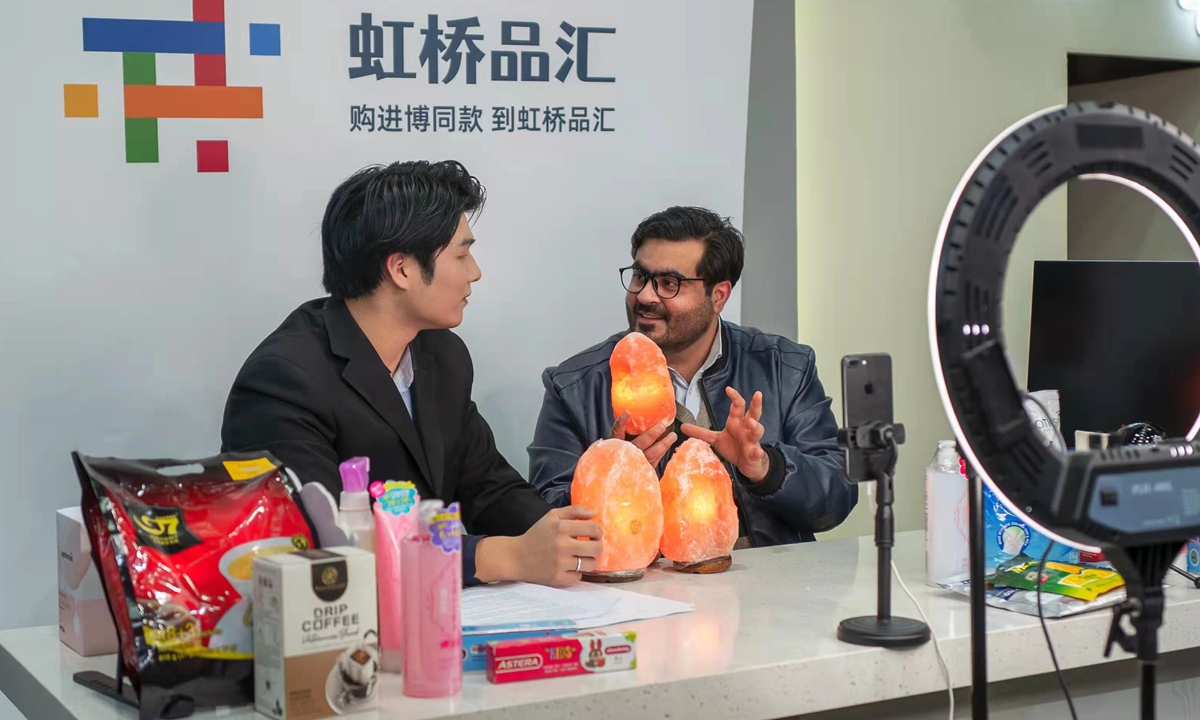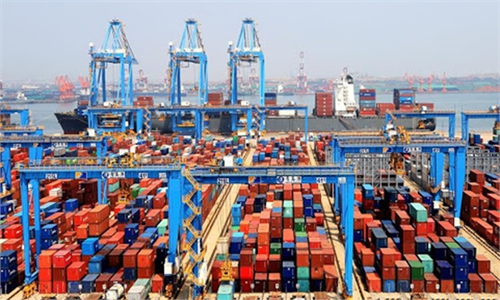Overseas products finding their way onto Chinese tables over the Spring Festival shopping season
Overseas products finding their way onto Chinese tables

The brother of Habib-ur-Rehman introduces Himalayan salt lamp to Chinese audience at a livestreaming event on January 10 in Shanghai. Photo: Courtesy of Habib-ur-Rehman
As the Spring Festival shopping rush, a time-honored tradition in the run-up to the Chinese New Year, kicked off, Chinese consumers are purchasing products ranging from food, clothes to cosmetics with unbridled enthusiasm. This year, the shopping season has been marked by more international products, prompting more foreign exports to China.On Monday, a Spring Festival livestream sales event was unveiled in Shanghai, marking the beginning of a series of festive promotions celebrating the upcoming Spring Festival holidays, which fall between January 31 and February 6.
Organized by Hongqiao Pinhui, an import commodity distribution center in Shanghai, the event assembled merchants from Russia, Pakistan, Cambodia and Sri Lanka to participate in a three-hour livestream show, introducing their premium products as well as their New Year celebration traditions to the Chinese audience.
Habib-ur-Rehman, who runs a Pakistani handmade carpet company, was among the foreign hosts and was joined by his brother.
"We were a little bit worried as it was our first time doing livestreaming facing such a large audience. But the result was reassuring. We have received many orders during our 30-minute slot. And we plan to continue the cooperation to extend the length of livestreaming next time," he said.
His livestream centered on a unique Himalayan salt lamp, which he believed would be an ideal decoration for Chinese families during the Spring Festival holidays.
Habib-ur-Rehman premiered the product at the 2021 China International Import Expo (CIIE) and sold three containers of lamps across the six-day exhibition.
"I am confident that this time we can sell much more than three containers via the live selling. This time it is a nationwide broadcast with such a big audience," he said, adding that China is a big market for them.
"Our lamps are priced at 200 yuan ($31.38) to 1,200 yuan each. It is not that expensive if measured against the purchasing power of Chinese consumers," he said.
According to a statement sent to the Global Times, Hongqiao Pinhui will organize a series of promotions through February 7, introducing some popular items from the CIIE to Chinese consumers, giving the Chinese Spring Festival a more "international" flavor. Highlights will include liquor from Russia, rice from Cambodia and lotion water from Japan.
In addition to Shanghai, East China's Zhejiang Province will also hold livestreaming shows for featured items from SCO countries and invite ambassadors from these countries to personally promote specialty products.
The SCO Featured Commodities Hall will rely on Douyin, China's popular short-video platform, and invite well-known anchors and e-commerce experts to select more than 1,500 high-quality products from SCO countries' well-known enterprises, covering food, household goods and other categories, helping more high-quality brands and products from SCO and Belt and Road countries tap into the huge Chinese consumer market.
E-commerce platform Hema Fresh, Alibaba's fresh-food chain is also planning a livestream show for featured products from members belonging to the SCO including Russian emperor crab and chocolate, Indian lobster, to Turkish biscuits and gums.
"We will continue to expand the existing key categories, tap into high-quality local commodities and ensure inventory is available in advance," said Yuan Ruofan, director of Hema Fresh industry development center, adding that during the Chinese Spring Festival promotion season, the company will launch a premiere event for Pakistani mangos into the Chinese market.
"Robust consumption during the Spring Festival is set to drive the growth of many countries' exports to China, and the dividends of the China's Spring Festival economy once again make the world feel the warmth of the world's second largest economy," Tian Yun, former vice director of the Beijing Economic Operation Association, told the Global Times on Tuesday.
Online shopping incentives
The Spring Festival shopping season, which runs from January 10 to February 7, continued to go online this year allowing shoppers to buy gifts for their family and friends, with many localities across China encouraging residents and migrant workers to not make the customary trip back to their hometowns as a precautionary measure against the further spread of COVID-19.
In order to boost the retail activity, many local governments have taken measures including issuing coupons valued at tens of millions of yuan to support local businesses.
Taking Shaoxing, a city in Zhejiang, as an example, it has announced that it will issue 140 million yuan ($22 million) of cultural tourism consumption coupons to activate local cultural tourism consumption.
China's leading e-commerce platforms, including Tmall and JD.com have launched a series of promotional events in the run-up to the Spring Festival, kick-starting this year's online shopping spree.
China's post-1990s generation is becoming the main force behind online New Year's shopping, according to Tmall, and product customization has become a trend. Meanwhile, high-quality nutrition products and at-home body testing equipment are expected to become popular New Year items with those not returning to their hometowns buying gifts for their parents. Data from Tmall Health and Medicine showed that toward the end of the year there was a clear spike in orders for nutritional health care gift boxes and home health products.
Tian forecast that this year's online Spring Festival shopping season will produce stronger sales compared with the same period last year despite the current resurgence of COVID-19, with the highly transmissible Omicron variant emerging on the mainland for the first time.
"Online shopping will not be restrained, and the good thing is that Chinese residents' average incomes have increased significantly in 2021, and people are in the mood to shop," Tian said.
However, offline consumption will be more vulnerable to disruption, he added.
In November, China's retail sales climbed 5 percent year-on-year, up from 4.3 percent in October, data from the National Bureau of Statistics showed. Retail sales from January to November reached 35.14 trillion yuan, down 4.8 percent on an annual basis.



